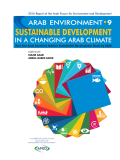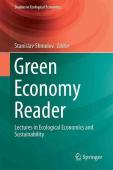Stocktaking on Inclusive Green Economy in Central Asia and Mongolia: A Sub-Regional Perspective was produced as part of the United Nations Environment Programme (UNEP) project “South-South Cooperation in Mongolia and Central Asian Countries: Sharing Knowledge on Inclusive Green Economies”. The project aimed to support Mongolia and Central Asian countries in developing their research capacity in the area of Green Economy and Ecological Civilisation and to share this knowledge with decision-makers and technical experts through knowledge exchange between China, Central Asian countries, and Mongolia.

This AFED report on "Sustainable Development in a Changing Arab Climate" recommends an alternative approach, based on integrating sustainable development principles within the anticipated rebuilding efforts. It calls upon local, regional, and international aid organizations not to limit their efforts to providing safety and basic necessities to those affected, but rather to use the relief plans as a launch pad for promoting new approaches to development, rooted in a transition to green economy.
This report, on prospects and challenges on the path towards achieving the SDGs, builds on the previous eight reports on the state of Arab environment, produced by the Arab Forum for Environment and Development (AFED) since 2008. AFED annual reports have so far addressed major development issues in the Arab region, including Water, Food Security, Energy, Green Economy, Ecological Footprint, Sustainable Consumption, and Climate Change. The report highlights the policy options available for the Arab countries to realize the Sustainable Development Goals by the 2030 target set by the United Nations, in light of the new political, economic, and social developments.
Africa stands at the threshold of a tremendous opportunity: its economies are seeking to shift to higher productivity sectors which can boost prosperity and drive developmental goals. At the same time, the right kind of economic transformation can also ensure that Africa’s growth is sustainable and resilient in the face of the increasing impacts of climate change.
This report offers key insights for policy makers seeking to deliver better growth and a better climate in African countries. It aims to help decision-makers take stock of the region’s recent experiences and draw lessons for the future. In particular, it seeks to crystallise ideas on how to harness the forces of economic, social and environmental change to accelerate inclusive and sustainable development across the region.
For Africa to achieve this better growth, the report identifies five action areas for governments to consider as they formulate development strategies and action plans for the future. These are:

The Green Economy Reader is a collection of thought provoking articles by the leading ecological economics thinkers of our time. State of the art in sustainability thinking, inspired by interdisciplinary ideas of ecological economics, this book is focusing on sustainability pathways, new economic theory, democracy and institutions, multidimensional assessment of sustainability, macroeconomic modelling and policies, climate change and renewable energy, resource flows and circular economy, regenerative cities, environmental conflicts and values. It will be helpful for MSc and PhD students in Economics, Management, Environmental Change, Ecological Economics, Development Economics, Sustainability and practitioners in business, international and nongovernmental organizations, such as UNDP, UNEP, IUCN, OECD. Rich, diverse and thought provoking collection of top level contributions, it will help to facilitate the transition towards sustainability and educational reform.
The eradication of extreme poverty is the minimum ethical floor of the global development agenda. With projections suggesting eradication is possible by 2030, the goal of ‘zero extreme poverty by 2030’ is a compelling objective.
However, climate change could be an obstacle to achieve this goal. It would hit the very poor hardest, making it tougher for those in extreme poverty to escape it, and drawing the moderately poor back into extreme poverty. Countries will need even greater ambition, and great support, to adapt and limit impacts on the poor.
But adaptation to climate extremes becomes increasingly implausible, particularly for the poorest, as we move beyond 2°C global mean temperature rise. Avoiding surpassing 2°C will require zero net greenhouse gas (GHG) emissions before the century’s end. To achieve zero emissions, and indeed to peak in the next couple of decades, all countries need to transform their economies.
